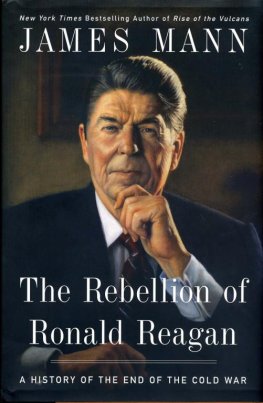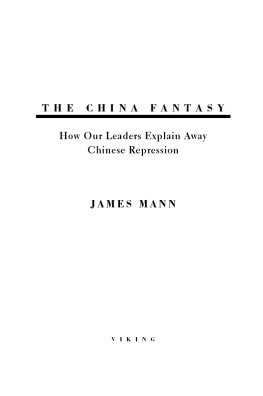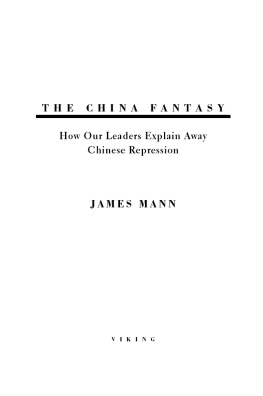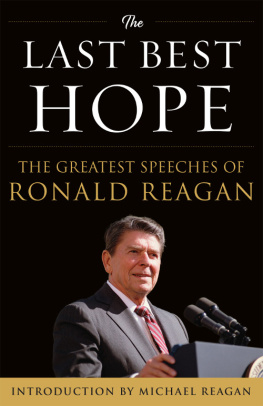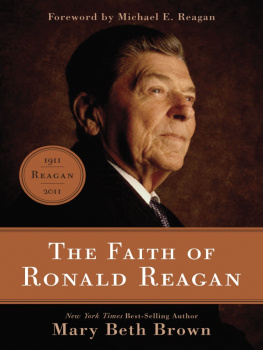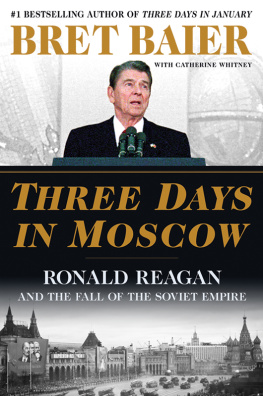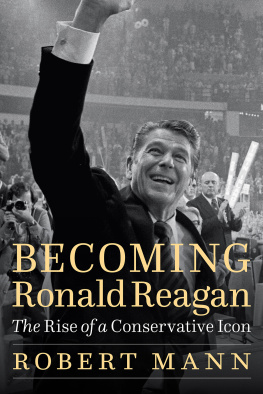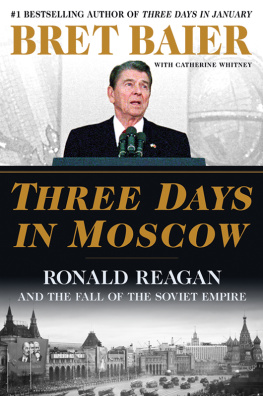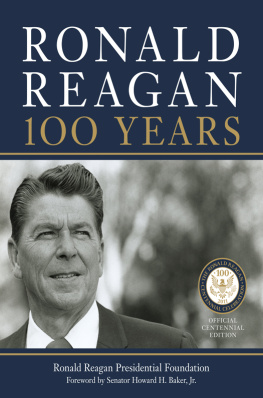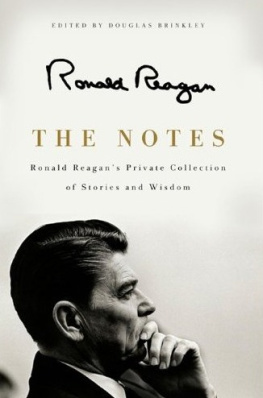James Mann
THE REBELLION OF RONALD REAGAN
A History of the End of the Cold War
For Elizabeth and Ted,
who will always mean more to me
than they can ever know

1982
November 8-10: Soviet general secretary Leonid Brezhnev dies and is succeeded by Yuril Andropov.
1983
March 8: Reagan, speaking to the National Association of Evangelicals, denounces the Soviet Union as an evil empire.
March 23: Regan announces Strategic Defense Initiative.
September 1: Soviet military shoots down South Korean commercial flight KAL 007, killing 269 passengers.
November 2-11: NATO forces conduct Able Archer 83, a military exercise testing chain-of-command procedures for nuclear weapons; CIA reports that Soviet officials feared it was the start of a surprise nuclear attack.
November 20: ABC television airs The Day After, dramatizing the impact of nuclear war on a single town in Kansas.
November 23: American Pershing II missiles are deployed in West Germany.
1984
January 16-17: Reagan deliver speech calling for renewed dialogue with the Soviet Union and mentioning opportunities for peace. Regan meets a White House with Suzanne Massie and sends her to Moscow as intermediary seeking a new cultural agreement.
February 913: Andropov dies; Konstantin Chernenko named new Soviet leader.
August 17: At secret meeting in Moscow, Soviet leaders complain to Erich Honecker that East Germany is drawing too close to West Germany.
November 6: Reagan wins reelection.
1985
March 1011: Chernenko dies; Mikhail Gorbachev becomes fourth Soviet leader in less than three years.
November 1921: Reagan and Gorbachev meet for the first time in Geneva.
1986
January 15: Gorbachev unveils a proposal for a nuclear-free world by 2000.
April 26: Soviet nuclear disaster occurs at Chernobyl.
July 18: Richard Nixon visits Gorbachev in Moscow, describes him as a leader with a steel fist.
August 13: Residents of West Berlin let the twenty-fifth anniversary of the Berlin Wall pass quietly by. Reagan calls for the wall to be torn down.
August 30: Soviets detain American reporter Nicholas Daniloff in response to American arrest of a Soviet diplomat on spying charges.
September 2830: U.S. and Soviet officials announce a deal for Daniloff s release. Shortly afterward, the White House announces that Reagan and Gorbachev will meet again soon in Reykjavik.
October 1112: At Reykjavik, Reagan and Gorbachev discuss dramatic cutbacks in missiles and nuclear weapons, but no agreement is reached.
November 34: Iran-Contra scandal breaks.
1987
February 26: Tower Commission finds Reagan traded arms to Iran in exchange for release of American hostages in Lebanon. Reagan fires Chief of Staff Donald Regan, names Howard Baker to succeed him.
February 28: Gorbachev announces Soviet Union is willing to try to conclude a treaty limiting intermediate-range missiles in Europe, without insisting that it be part of a larger agreement.
April 2627: Richard Nixon and Henry Kissinger warn in an op-ed of the dangers of Reagans diplomacy with Gorbachev. Reagan meets with Nixon at the White House.
May 27-28: In East Berlin, Gorbachev persuades Eastern European leaders to approve new military doctrine in which Warsaw Pact is considered a strictly defensive alliance.
May 28: West German teenager Matthias Rust flies Cessna plane through Soviet air defenses to Moscow; Gorbachev responds by shaking up Soviet military command.
June 12: Reagan, in West Berlin, delivers speech calling on Gorbachev to tear down this wall.
September 7: With Soviet acquiescence, Erich Honecker makes first visit to West Germany.
December 8-10: Reagan and Gorbachev hold summit in Washington, conclude INF Treaty.
1988
May 27: Senate ratifies INF Treaty.
May 29-June 1: Reagan visits, Moscow, says his description of Soviet Union as an evil empire was from another time and another era.
November 8: Bush wins presidency.
December 7: At United Nations Gorbachev announces troop reductions; holds meeting at New Yorks Governors Island with Reagan and Bush.
1989
January 19: Erich Honecker says the Berlin Wall will still exist in 100 years.
January 22: Two days after Bushs inauguration, National Security Adviser Brent Scowcroft says,The Cold War is not over.
May 31: On trip to Europe, Bush repeats Reagans exhoration to tear down the Berlin Wall; calls for a Europe whole and free.
June 4: In Poland, opposition Solidarity candidates triumph in parliamentary elections.
June 13: Reagan, in Europe, urges Bush administration to be willing to take some risks by negotiating with Gorbachev.
September 11: Hungary lifts controls on travel by East Germans to Austria? East Germans stream across borders to Hungary an Czechoslovakia.
October 11: Honecker steps down as East German leader, is succeeded by Egon Krenz.
November 9: Krenzs regime says it will ease travel restrictions; amid confusion about what the new rules mean, East Germans stream trough Berlin Wall and are not stopped.
Several competing mythologies have developed about the role of Ronald Reagan in the end of the Cold War. On one side is the view that through confrontation and pugnacity Reagan won Americas four-decade-long conflict with the Soviet Union. Proponents of an opposing view hold that the fortieth president was merely lucky or utterly irrelevant. My aim in this book is to reach beyond these simple formulas, to challenge old stereotypes about Reagan, and, through a combination of new interviews and newly available documents, to look back at what actually happened.
I first became interested in the Reagan years while working on another project. I was examining the careers of the members of George W. Bushs foreign-policy team for a book that was later published as Rise of the Vulcans. During this research, I happened across a then-unknown episode: the Reagan administration had conducted elaborate, highly classified exercises designed to keep the U.S. government operating in various undisclosed locations outside Washington in case of a nuclear war with the Soviet Union. The details of the secret program (in which Dick Cheney and Donald Rumsfeld had been key participants) made me want to look further at the Reagan years. Where did this episode fit in? Was the president of the United States really willing to contemplate a large-scale nuclear conflict? More generally, what was Reagan himself thinking and doing? Reagans rhetoric toward the Soviet Union was clear enough, but what was the relationship between his rhetoric and his actual policies? That was the starting point for this book. As I had in previous books, I wanted to examine the hidden aspects of American foreign policy and to explain them in a historical narrative.
During the course of the research, I found some surprises. The archives show that in dealing with the Soviet Union, Reagan on occasion operated in much the same way as he did in the Iran-Contra affair, secretly making use of low-level private intermediaries to carry personal messages back and forth. Even some of the plans for summit meetings with Mikhail Gorbachev went not through the secretary of state but through a lowly American author, a woman who had gotten to know both Reagan in Washington and a KGB official in Moscow. The archives also show that Reagan at one point had a frosty standoff inside the White House with former president Richard Nixon, who had been secretly brought back to his old haunts for the first time since he had left after his Watergate resignation. Nixon was more skeptical than Reagan that Mikhail Gorbachev represented a significant change in Moscow. Reagan sought Nixons support for his efforts to cut back on nuclear weapons and ballistic missiles; Nixon refused to give it.

